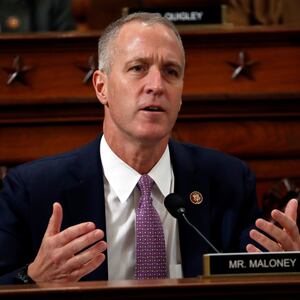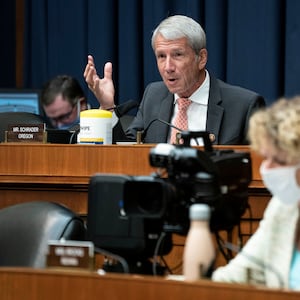For several election cycles it has been understood that members of Democratic leadership would line up to defend their incumbents against insurgent primary challengers, with few exceptions.
But as progressive influence in Congress continues to grow—and the number of Democrats elected after successfully primarying incumbents rises—this practice has increasingly become an open rift in the Democratic Caucus that threatens to only widen as the midterm elections draw closer.
It’s not new for incumbents to stump for fellow incumbents. Even the Congressional Progressive Caucus has a policy against endorsing challengers to sitting representatives, despite a number of its own members being elected after successful primary upsets. But a faction of the left says when it comes to members of leadership, the rules should be different.
“It's a disturbing pattern, frankly,” said Maurice Mitchell, national director of the progressive Working Families Party. “And we think that Democratic leadership kind of putting its thumb on the scales specifically, consistently, to purge progressives from the caucus, is short-sighted.”
Progressives advocating for a hands-off approach to these Democrat-vs.-Democrat contests say it’s about giving newcomers a fair shot.
“Primaries are the only way for voters to have a say in the party,” said Waleed Shahid, spokesperson for Justice Democrats, a group that often backs progressive challengers.
Rep. Ro Khanna (D-CA) told The Daily Beast in a statement, “Voters deserve the chance to fairly evaluate and decide who they want to represent them in Congress. Primaries are a chance for new, exciting ideas and candidates to emerge and the Democratic Party and our democracy benefits as a result. Everyone should support that.”
In many deeply blue congressional districts, Democratic incumbents often coast through re-election cycles with little difficulty and remain in office until they willingly retire. That is, unless they have a viable challenger, many of which are unwilling to merely wait for an opening.
These districts, in particular, should be off-limits to leadership meddling, progressives in this space argue, given that a Democrat will likely win the general election regardless of the primary outcome. And in a year where House Democrats are forecast to face difficult general election prospects this November, Shahid pointed out, there are better places for party leadership to spend their time.
“It's extremely alarming that the critical resources and the priorities from the highest levels of the Democratic Party leadership are going to protect incumbents from having to face any competition and mostly deep blue districts instead of protecting the swing states swing seats that were in danger of losing in November,” Shahid said. “The priorities seem pretty backwards to us.”
In Ohio’s 11th Congressional District, for example, Rep. Shontel Brown (D) beat Republican Laverne Gore in the 2021 special election by more than 57 points. The GOP hardly stands a chance there this November, virtually guaranteeing that Democrats will retain the seat.
But leadership, including Democrats’ so-called kingmaker House Majority Whip Jim Clyburn, still waded into the primary to defend Brown against progressive Nina Turner, who was mounting a rematch bid after losing to the congresswoman in their 2021 primary. They see her as a reliable member in the House—and she is a member of the Congressional Progressive Caucus.
In an interview with The Daily Beast last month, Clyburn said stumping for his fellow incumbents is merely a matter of providing a reference check to voters of a member’s work. He stressed that voters will always have the final say.
In Illinois 7th Congressional District, Rep. Danny Davis, another CPC member, is facing progressive challenger Kina Collins, a local activist. The seat is so solidly blue, there isn’t even a Republican challenger.
But leadership is still working to defend their longtime colleague who’s regarded as a reliable vote for party priorities. Just last week, House Democratic Caucus chair Hakeem Jeffries, a fellow progressive, hit the trail to stump for Rep. Danny Davis alongside faith leaders in Chicago. Davis, who’s held the seat since 1997, Davis is a member of the Congressional Progressive Caucus but is now facing progressive challenger Kina Collins.
“I would hope that party leadership would understand that it’s important that we have healthy primaries, that we excite the electorate and that we are trying to send our best and our brightest to Congress,” said Collins, who is backed by a number of progressive groups.
Although Jeffries himself once challenged an incumbent while running for the New York State assembly, he’s all-in on retention, launching a political action committee focused on protecting incumbents, hoping to maximize the number of his colleagues that return to the halls of Congress next year.
The Team Blue PAC this cycle has supported Brown, Davis, Reps. Donald Payne (D-NJ) and Dina Titus (D-NV), all of whom had or have progressive challengers.
Spokesperson for the Team Blue PAC Maria Hurtado told The Daily Beast the group remains dedicated to protecting incumbents from diverse backgrounds and ideologies, and will continue to hit the trail this cycle. “The PAC exists to support proven legislators, not to respond to faux outrage from the hard left.”
Jeffries’ spokesperson Christie Stephenson also said in a statement, “The online shadow boxers are clearly in their feelings as a result of a difficult primary season, including being obliterated by Rep. Shontel Brown in Ohio.”
“If the virtue signalers have such a problem with how Chairman Jeffries chooses to support his colleagues, they are free to primary him in New York’s 8th Congressional district. Despite our repeated invitations, we are still waiting for the extreme left to recruit a candidate and show up in the streets of Brooklyn,” Stephenson added. “To date, nothing but crickets. Chairman Jeffries will continue to protect the House Democratic majority, an effort for which he has raised millions and campaigned across the country this election cycle.”
Davis also defended leadership’s right to get involved, telling The Daily Beast in a phone interview, “Leadership, they’re also citizens and they’re also people and they also have a voice. And they should use their voice.” The congressman has endorsements from Chicago Mayor Lori Lightfoot and Illinois Gov. J.B. Pritzker, among others.
Ire from the left-most wing of Democrats has extended to their involvement in swing seats too. One of progressives’ most well-backed candidates this cycle is Jessica Cisneros, who ran against incumbent Rep. Henry Cuellar.
Cuellar, meanwhile, was backed by leadership, which has caused backlash galore.
The embattled incumbent, Cuellar, had his home raided by the FBI this year, is anti-abortion, and was a member of the so-called “unbreakable nine”: a group of House Democrats that vowed to vote against the now-defunct Build Back Better Act unless the bipartisan infrastructure deal was passed first.
At first, it appeared leadership was mostly leaving Cuellar to his own devices. They didn’t show up to an annual parade in Laredo to ride through town alongside Cuellar, as they had in years past. They weren’t particularly vocal during his first primary election this year on March 1.
But in the months since, as Cuellar went into a primary runoff against his progressive challenger Jessica Cisneros, they hopped back into the game. House Speaker Nancy Pelosi recorded a robocall in favor of Cuellar’s re-election. Clyburn also campaigned there ahead of the primary runoff.
As of Monday night, the final count in Cuellar and Cisneros’ race showed the congressman just 281 votes ahead. Cisneros has said she intends to file for a recount.
Ahead of the primary runoff, Cisneros had pushed leadership to back off the race, asking them not to “stand in the way of delivering for South Texans.” Rep. Alexandria Ocasio-Cortez criticized leadership’s involvement in a series of tweets that called support for Cuellar an “utter failure of leadership” and argued “Congress should not be an incumbent protection racket and sadly it is treated as such by far too many.” Progressives online raged at leadership’s support for the congressman—particularly against a young woman of color.
But House Democrats’ brass didn’t see it that way.
Aside from his reputation as a reliable vote and a good leadership soldier, perhaps most importantly to House Democrats’ bigwigs is Cuellar’s moderate record in a district that’s gone from blue to purple post-redistricting. There’s a very real chance of a Republican taking the South Texas seat in November—particularly given the GOP’s gains with Latino voters in recent years.
In Oregon’s 5th Congressional District, fellow “unbreakable nine” member Rep. Kurt Schrader also faced a progressive primary challenger, Jamie McLeod Skinner, who successfully beat him in the Democratic primary in May.
In that race, Schrader secured President Joe Biden’s first endorsement of the 2022 cycle and the Democratic Congressional Campaign Committee came to his defense. The Oregon seat is slightly more red post-redistricting, adding a somewhat different thinking among party leaders. But still, progressives pushed back on leadership’s involvement—as did a number of local Democratic Party chairs in the district who wanted DCCC to stay out of the primary.
Following McLeod-Skinner’s win, DCCC said she “ran a strong campaign that showed the power of her grassroots organizing.”
There are, of course, scores of other outside groups involved in primaries that haven’t garnered the same backlash. But Mitchell argued to The Daily Beast that leadership in particular is responsible for being a unifying force in the party.
“It’s the role of leadership to lead the entire caucus and to unite all the various factions of the caucus—not to choose a side,” he said.
There’s more at stake in these intraparty dynamics than the outcomes of individual races. The relationship between progressives and leadership matters, particularly in the House, as Democrats brace themselves for new ranks post-November.
Though House Speaker Nancy Pelosi is running for re-election, she’s previously said this will be her last term as speaker, leading to speculation that she will retire after November or step back from leadership at a minimum.
Tensions between progressives and leadership could also take a toll on some of Democrats’ leadership on the campaign side. DCCC Chair Sean Patrick Maloney just last month faced heaps of progressive backlash for teeing up a musical chairs of New York’s Democratic incumbents after announcing he would refuse to switch districts post-redistricting, which threatened to unleash a member v. member primary.
Ultimately, Rep. Mondaire Jones (D-NY) moved districts instead. Maloney stayed in place—with multiple contenders already in the seat.
On Tuesday, Ocasio-Cortez endorsed his primary challenger, progressive state Sen. Alex Biaggi. Maloney in a statement responded that he respects Ocasio-Cortez’s decision, “[O]n her endorsement, we are going to have to agree to disagree. This election comes down to voters in NY-17, and I am honored to have received overwhelming support locally, including endorsements from nearly 40 elected leaders and democratic party committees.”
Mitchell warned there will only be more progressive challengers in the years to come—particularly with more organized and “sophisticated” campaigns. Given that shift, he says it’s time for Democrats’ chiefs to get with the program.
“To me, if I was in leadership, instead of figuring out how to stop this phenomenon that is unstoppable, I’d figure out how we learn from it,” he said.









